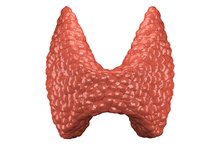What Are the Causes of Chills and Night Sweats?
Night sweats, also called sleep hyperhidrosis, can be associated with a variety of serious illnesses. Night sweats are differentiated from primary hyperhidrosis, which is characterized by excessive sweating from one area of the body. According to an article by James Mold and colleagues in the "Annals of Family Medicine," physicians are unable to discern the cause of night sweats if the symptom appears without an associated illness 1.
If you are experiencing serious medical symptoms, seek emergency treatment immediately.
Hyperthyroidism
Hyperthyroidism occurs when the thyroid gland located at the front of the neck secretes too much thyroid hormone. The thyroid gland is an organ of the endocrine system that secretes thyroxine, or T4, and triiodothyronine, or T3. These hormones control how the cells of the body produce energy through the process of metabolism. Hyperthyroidism increases metabolism, thereby producing more heat, which is a by-product of metabolism.
- Hyperthyroidism occurs when the thyroid gland located at the front of the neck secretes too much thyroid hormone.
- The thyroid gland is an organ of the endocrine system that secretes thyroxine, or T4, and triiodothyronine, or T3.
Infection
What Is Low TSH?
Learn More
Chills occur after exposure to cold; however, excessive sweating also decreases body temperature during night sweats and can cause chills.
Cancer
Lymphoma is a cancer of the lymphatic system and tissues that produce, carry and store white blood cells. Because it disturbs the immune system, cancer can cause night sweats in addition to chills, fatigue and itchy skin, according to the University of Maryland Medical Center 234.
Other
Cause of Chills in a Warm Environment
Learn More
The aging process can cause night sweats. A 2004 study by James Mold and colleagues reports that 10 percent of older individuals experience night sweats.
Menopause can also cause night sweats. Menopause is a natural event marking the end of menstruation and fertility. The process involves hormonal changes that alter the chemistry of the body, in turn causing symptoms such as night sweats. As the ovaries stop producing hormones such as estrogen and progesterone, hormone levels begin to drop, which causes night sweats in addition to hot flashes and mood swings, according to the University of Maryland Medical Center 234.
- The aging process can cause night sweats.
- The process involves hormonal changes that alter the chemistry of the body, in turn causing symptoms such as night sweats.
Related Articles
References
- "Annals of Family Medicine"; James Mold, Michelle Roberts and Hesham Aboshady; 2004
- Centers for Disease Control and Prevention. About HIV/AIDS. Reviewed August 14, 2019.
- National Sleep Foundation. Four Common Causes of Night Sweats.
- Arnardottir ES, Janson C, Bjornsdottir E, et al. Nocturnal sweating--a common symptom of obstructive sleep apnoea: the icelandic sleep apnoea cohort. BMJ Open. 2013 May 14;3(5). pii: e002795. doi:10.1136/bmjopen-2013-002795
- Centers for Disease Control and Prevention. HIV Testing. Reviewed November 8, 2019.
Writer Bio
Alison Smith is an academic from Toronto, who has six years of experience publishing scientific manuscripts and abstracts within “Brain Research” and “The Society for Neuroscience.” Smith obtained her Ph.D. from the University of Waterloo, and held doctoral funding from the Natural Science and Engineering Research Council (NSERC).








